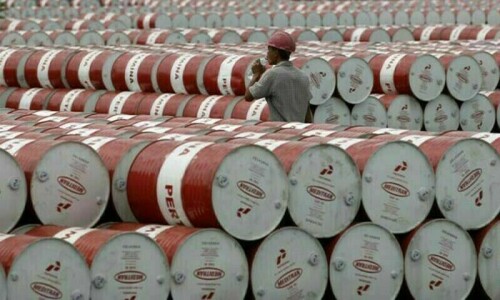ISLAMABAD: Due to a bearish trend in the international market, petrol and high-speed diesel (HSD) prices are expected to decrease by approximately Rs6.50 to Rs7.50 per litre on May 31, despite a slight exchange rate loss.
Informed sources said the prices of petrol and HSD had declined in the international market by about $3.25 and $2.10 per barrel, respectively, in the last fortnight. This is on top of the $8.7 and $4.3 per barrel drop in petrol and HSD rates, respectively, in the previous fortnight.
Depending on the final calculation of the Inland Freight Equalisation Margin (IFEM), the petrol price is projected to come down by Rs7.25 and HSD by Rs6.25 per litre. The import premium on petrol has decreased by about 7pc in the last fortnight to $9.70 from $10.30 per barrel.
However, the rupee slightly lost about 10 paise against the US dollar during the fortnight. The net impact is estimated to be about Rs7 per litre reduction in petrol price from the existing ex-depot rate of Rs273.10.
The HSD price also dropped by about $2.10 per barrel in the international market, and its import premium paid by the benchmark Pakistan State Oil (PSO) remained unchanged at $6.50 per barrel. Thus, the HSD rate was estimated to be down by Rs6.25 per litre, subject to final exchange rate adjustment and IFEM in pricing, from the current rate of Rs274.08 per litre at the depot stage.
Officials said the price of petrol had gone down to about $95 per barrel from around $98.27 per barrel earlier in the international market, while the price of HSD had reduced to $97 from $99.12 per barrel. The prices of petrol and HSD had also dropped by Rs15.93 and Rs7.88 per litre, respectively, with effect from May 16.
The government has already achieved the Rs60 per litre petroleum levy—the maximum permissible limit under the law—on both petrol and HSD and collected Rs720bn in the first nine months ending March 31. The government had set a budget target to collect Rs869bn as petroleum development levy (PDL) on petroleum products during the current fiscal year under the commitments made with the International Monetary Fund (IMF).
Higher petroleum and electricity prices have been fuelling inflation. Petrol is mostly used in private transport, small vehicles, rickshaws, and two-wheelers and has a direct bearing on the budget of the middle and lower middle classes. On the other hand, HSD prices are considered highly inflationary as they are mostly used in heavy transport vehicles, trains, and agricultural engines like trucks, buses, tractors, tube wells, and threshers. They particularly add to the prices of vegetables and other eatables.
Currently, the government charges about Rs82 per litre tax on petrol and HSD. Although general sales tax (GST) is zero on all petroleum products, the government is charging Rs60 per litre PDL on both products. On the other hand, it is charging Rs50 per litre for high-octane blending components and 95RON petrol. The government also charges about Rs19-20 per litre customs duty on petrol and HSD.
Petrol and HSD are the major revenue spinners, with monthly sales of about 700,000-800,000 tonnes compared to just 10,000 tonnes of kerosene demand.
Published in Dawn, May 29th, 2024
















































Dear visitor, the comments section is undergoing an overhaul and will return soon.